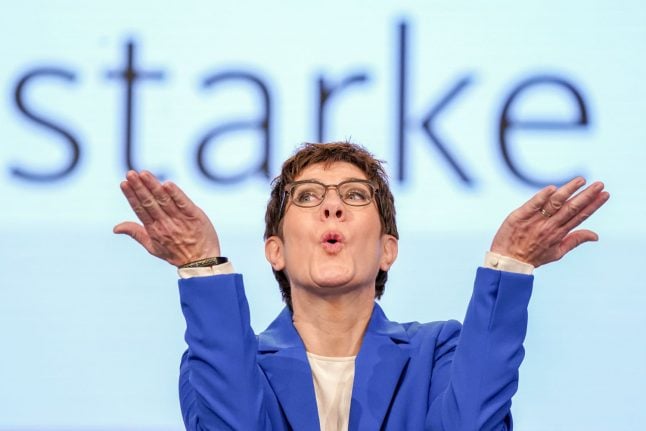“If you are of the opinion that the Germany I want is not the one you want… then we should end it. Here, now and today,” Kramp-Karrenbauer told delegates, responding to criticism of her leadership.
Widely known by her initials “AKK”, the 57-year-old has endured a rocky first year at the helm since taking over the party leadership from Chancellor Angela Merkel at last year's conference.
READ ALSO: Annegret Kramp-Karrenbauer: The woman behind the 'mini-Merkel' headlines
With mutinous grumblings growing over her leadership style and criticisms of the coalition government, Kramp-Karrenbauer hit back.
“If you are of the opinion that the Germany I want is not the one you want… then we should end it. Here, now and today,” she told the party at the opening of their annual congress.
“To stand here as a party and say that everything we have done in the last 14 years was wrong is not a good election strategy,” she warned as the CDU held its annual conference.
The comments were a thinly-veiled barb at 64-year-old lawyer Friedrich Merz, who narrowly lost out to Kramp-Karrenbauer in last year's leadership vote.
Merz, a delegate at this weekend's conference, returned to the limelight in recent weeks when he described the CDU-led government as “abysmal” and accused Merkel of poor leadership.
But as AKK won a standing ovation lasting seven minutes, and with party heavyweights lining up to praise her, Merz dramatically backed down.
“We are loyal to our party chairs and our party leadership, and to the government that we have carried for 50 years, and those were good years for Germany,” he told the congress.
AKK in Leipzig on Friday. Photo: DPA
Stay united
While not wading directly into the war of words, Merkel urged the party to stay united, saying that it should “heed” the motto of the congress in past years — leading together and bringing together.
As Merkel nears the end of her fourth consecutive term, the CDU has been struggling to put down party infighting over her legacy and over the future shape of the party.
Pressure is also increasing on the centre-right party, as it has been struggling to halt a haemorrhage of voters to the Greens and to the far-right Alternative für Deutschland (AfD).
AKK's own reputation has also suffered due to a string of PR gaffes.
In April, she was widely condemned for an ill-judged joke about transgender
bathrooms. A month later, she incurred the wrath of Youtubers with an attack
on freedom of speech online.
“I don't know many people who are convinced by her leadership style,” CDU regional politician Hans-Jörn Arp told DPA news agency on Wednesday.
'Too early'
Merz is now the most popular choice among the membership when it comes to
who will run to succeed Merkel as Chancellor at the next elections.
Traditionally a question that the CDU leadership decides behind closed doors with its Bavarian sister party CSU, there are now growing calls to involve the party base in the candidate selection process.
Ahead of the conference, six motions have been put forward on the introduction of a members' vote or internal primaries.
However an outright coup attempt against AKK by Merz's supporters remains unlikely according to Hans Vorländer, a political scientist at Dresden's Technical University.
“It is much too early for the CDU to make personnel decisions,” he told AFP, claiming that the party needed more time to prepare for life after Merkel, who is set to step down in 2021 after 16 years at the helm.
Huawei ban
Yet personnel problems are not the only thing unsettling Germany's ruling
party and its leader.
Kramp-Karrenbauer has also been accused of failing to give her party a clear political profile.
In a controversial letter published by German media last week, the CDU's state parliament leader in Baden-Württemberg, Wolfgang Reinhart, said the party was “insolvent” in terms of policy.
“The CDU has no antennae and no agenda for the big questions of our age,”
he wrote, condemning what he called the “radical pragmatism” of recent years.
Reinhart's comments reflected wider frustrations over the unpopular governing coalition between the CDU, the Bavarian CSU and the social-democratic SPD.
A recent compromise with the SPD over pension reform enraged conservative Christian Democrats.
Party delegates are expected to vent their frustrations this weekend with a
vote urging the government to exclude Chinese technology firm Huawei from the
construction of a new 5G mobile network in Germany.




 Please whitelist us to continue reading.
Please whitelist us to continue reading.
Member comments